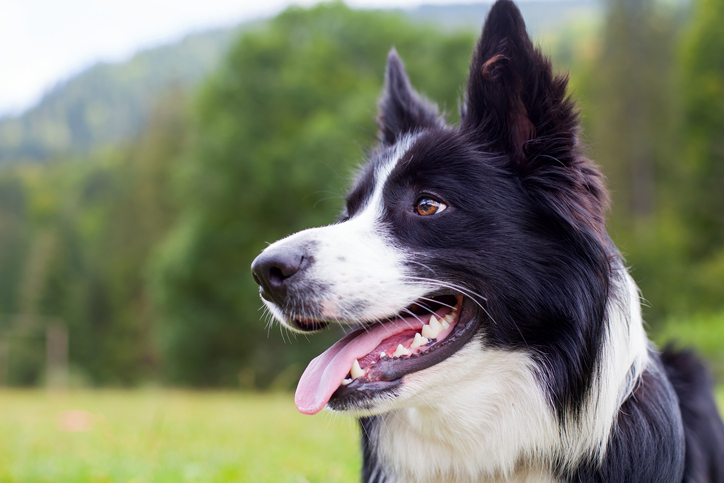6 Causes of Excessive Panting in Dogs in Highland and Westville, IN
Dogs are very expressive creatures. They have many different ways of communicating through vocalization like barking and whining, body language and behavior. Panting is a common behavior in dogs in Highland and Westville both big and small and can mean many different things.

However, while normal panting is common, excessive panting in dogs is something to keep an eye out for as it may mean that your pet is struggling with a condition that’s causing this and could need medical attention.
Reasons for Excessive Panting in Dogs in Highland and Westville, IN
Excessive panting isn’t always something that requires immediate veterinary care, as the reasons for this condition range from common behavioral reactions to something more serious. It’s important to know what can bring this on in your pet so you know how to best handle the situation when it arises.
Six common causes for excessive panting in dogs include:
Excitement
When a dog in Highland or Westville is happy to see her owner come home or meets someone new she may pant in short bursts, often along with vocalization. It’s her way of letting us know she’s having a good time.
Stress or Anxiety
Panting can be your dog’s way of telling you that she’s anxious about something. Stress or anxiety can be brought on by a variety of different things, ranging from loud noises to extreme life changes.
If you think your dog’s panting may be a sign of anxiety, pay close attention to her language. Additional signs that your dog may be anxious about something include:
- Pacing
- Hiding
- Walking low to the ground in a fearful stance
- Yawning
- Lack of eye contact
Your veterinarian in Highland or Westville may suggest behavior modification to help teach her coping mechanisms. Anti-anxiety medication like Xanax or Prozac can be helpful in treating your dog’s anxiety, but you should always wait and consult with your vet to see if this is would be the best route to go with your pet.
Heat
Panting is how dogs cool themselves down. Dogs can’t sweat through their skin like we do to bring our body temperature down. They only sweat through the pads of their feet. By breathing in air in quick bursts, it helps speed up the evaporation of water from your dog’s nose and lungs. This results in cooling the body down from within.
Because dogs can lose a lot of fluids in a small amount of time, it’s best to keep an eye on her and make sure she always has access to plenty of fresh water. If she’s outside on a particularly hot day and she seems to be panting more than usual, you should bring her indoors and give her cool, not cold, water.
If she’s still panting after she’s cooled down, it’s best to take her to the vet to see if something else is going on.
If Your Dog Gets Overheated
If the panting persists and your dog seems to be uncomfortable or disconnected and not responding to you, she may be overheating or dehydrating and it’s important to take action immediately. You can help her cool down by giving her cool water and cold compresses or draping cool washcloths on her back to start bringing her body temperature down.
It’s best to call an emergency vet in Highland or Westville, IN if you think your dog might be starting to overheat. The vet may want to give your dog fluids and run blood work to see if there was any organ damage.
Other signs that your dog could be overheated or suffering from heatstroke to look out for are:
- Bright red tongue
- Thick and sticky saliva
- Weakness
- Vomiting
- Unsteady on their feet
- Diarrhea
What to Do
If your dog is showing any of these signs it’s recommended that you get her inside immediately if she’s been outside on a walk or a hike with you, and give her cool water but not cold as it could shock her. If her symptoms persist, it’s best to call the vet and get her checked out as soon as possible. The vet will most likely give her fluids and run some tests to rule out any permanent damage. In extreme cases of heatstroke, your dog may have to be admitted for ‘round the clock care.
How to Prevent Heatstroke
The best way to prevent your dog from getting heatstroke is to implement some best practices to keep her cool and hydrated. Always make sure she has enough water, both indoors and out.
If she’s joining you for a walk or hike, don’t forget to bring enough water for her as well as something for her to drink out of. Collapsible water dishes are available online and at pet supply stores.
Take the time to give her little breaks in the shade along the way. Try to limit her time outside on especially hot days and never leave her in a hot car or home. If you feel heat, she’s feeling much hotter and is more likely to overheat.
Pain
Excessive panting can also be a sign that your dog is in some kind of pain. If you notice that your dog is acting like she’s in pain, take her to see the veterinarian or emergency vet right away so they can find the underlying cause of the pain and help your pet right away.
Laryngeal Paralysis
Laryngeal Paralysis is a condition which causes paralysis of the larynx, or voice box, which makes it difficult for the dog to breathe properly. If your dog has Laryngeal Paralysis, in addition to excessive panting, she may be audibly struggling to breathe and making sounds like she’s trying to clear her throat. It’s most prevalent in large, older dogs such as Labradors and Newfoundlands.
It’s important to have your veterinarian in Highland or Westville run specific tests to check for the disease. The leading treatment is a corrective surgery that permanently opens the airways. The surgery can prolong lifespan and improve quality of life.
Cushing’s Syndrome
If in addition to panting, your dog is drinking and urinating more, eating less than usual, losing hair or bruising easily she may have Cushing’s Syndrome. Cushing’s tends to present in dogs six or older, and certain breeds are more genetically predisposed.
Cushing’s Syndrome is when a dog’s body overproduces the stress hormone cortisol. Cortisol not only helps respond to stress as well as fight infections and regulate weight.
If you think your dog may have Cushing’s, you should have your vet do a complete examination. Your vet will decide which tests to run, as there is no completely conclusive test to diagnosis the disease. Once other medical issues are ruled out, Cushing’s can be treated with surgery or medication.
Talk to a Vet if Your Dog’s Excessively Panting in Highland and Westville, IN
While regular panting can be very normal behavior for dogs, excessive panting can be caused by a variety of different things that could need immediate medical attention. It’s very important to pay attention to your dog’s behavior to see if the panting continues or becomes worse.
Our teams at Emergency Veterinary Care Centers in Highland and Westville, IN are available 24 hours a day so your pet can always get the care they need as soon as they need it. We know how serious excessive panting can be for dogs, and we’ll make sure to find the root of what’s causing his behavior in your pet so we can develop the best treatment plan for them going forward. If you have any additional questions, contact us at either of our locations, day or night.
Recent Posts
About Us
At Emergency Veterinary Care Centers (EVCC), we know that pet emergencies are unpredictable and often stressful. That's why our team, with over 20 years of emergency and critical care experience, is ready to assist you and your pet in the toughest situations.


